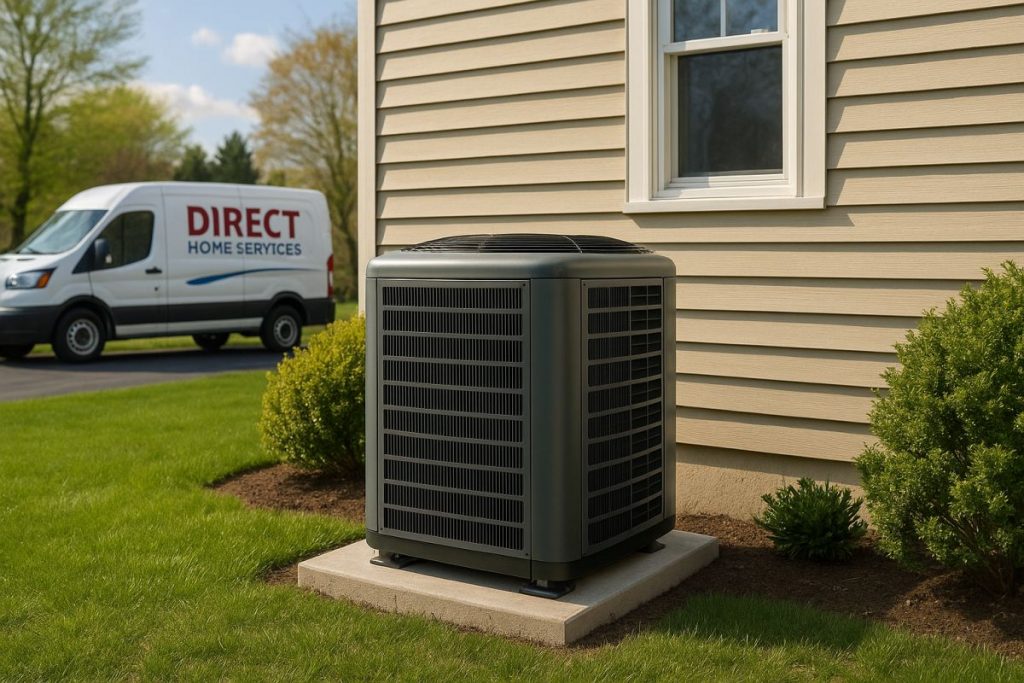In most cases, a heat pump cools just as well as an air conditioner. It uses electricity to transfer heat from your home, just like a standard AC when in cooling mode. The main difference is that a heat pump can also reverse the process to provide heating in colder months.
This guide will explain how heat pumps work, compare their cooling performance to traditional AC units, and help you understand which system suits your home. If you are in Central CT, contact Direct Home Services at 860-339-6001. We will evaluate your home and offer system recommendations based on your requirements.
How Well Do Heat Pumps Cool Compared to Air Conditioners?
When comparing cooling performance, modern heat pumps are very close to, and sometimes match, the output of high-efficiency air conditioners. Both systems use the same basic method – moving warm air out to lower the indoor temperature.
In regions with average summer temperatures, a heat pump system can meet daily cooling needs without issue. The performance difference becomes more noticeable in areas with prolonged high heat, where an air conditioner may cool more quickly or consistently maintain temperature.
How Do Heat Pumps Work?
A heat pump functions as a cooling system by moving heat energy from inside your home to the outside. However, unlike air conditioners that only provide cooling, a heat pump system also offers heating from a single unit.
The process involves key components, such as the air handler, which circulates cool air throughout your home, and the evaporator coil, which cools warm indoor air. The versatile system uses refrigerant gas to absorb indoor heat and release it through the condenser coil outside.
Thanks to advances in heat pump technology, many modern heat pumps now match or exceed the performance of traditional air conditioning systems. They are also a cleaner alternative to fossil fuels, known for better energy efficiency.
Benefits of Using a Heat Pump for Cooling
A heat pump offers better cooling while serving your heating needs, making it a practical solution for year-round indoor comfort. This helps reduce equipment costs and overall energy use.
Key benefits of using a heat pump system:
- All-in-one system: A heat pump system handles both cooling and heating, reducing the need for a separate air conditioner and gas furnace.
- Lower operating costs: Heat pumps are popular for energy efficiency as they move heat energy rather than creating it.
- Clean energy source: Heat pumps use electricity instead of fossil fuels, lowering your home’s emissions and environmental impact.
- Advanced performance: Modern heat pump technology supports stable operation, especially in moderate climates.
- Fewer maintenance needs: With fewer moving parts than air conditioners, many heat pumps require less frequent service.
- Zoned comfort options: Some heat pump systems support zoning, allowing better air temperature control in different parts of the home.
- Quiet operation: Heat pumps produce less noise during use than air conditioners.
- Space-saving design: A single cooling system that handles heating reduces equipment footprint.
- Stable indoor climate: Heat pumps work with components like the air handler and evaporator coil to maintain steady airflow and consistent temperatures.
- Eligibility for heat pump tax credits: In some areas, like Connecticut, heat pump installation may qualify for 30% of the cost, up to $2,000 per year, through energy rebates.
When properly installed and maintained, a heat pump can be a reliable alternative to a separate air conditioner, especially in areas with mild summers.

When Air Conditioning Might Be a Better Choice Than a Heat Pump
Heat pump cooling efficiency is ideal in many settings. However, there are situations where a traditional air conditioning system may be more suitable, particularly in regions with long, extremely hot summers. In these environments, air conditioners often cool faster and maintain indoor air temperature more consistently under continuous high loads.
Older homes without updated insulation or minimal airflow control may also benefit more from a standalone air conditioner, especially when paired with a gas furnace for heating. This combination offers reliable performance in extreme weather.
In addition, heat pump systems typically operate at slightly lower capacities in hotter climates, which can impact cooling speed and overall comfort. A dedicated AC might be a more effective choice if a home’s cooling needs are high throughout the year.
Another consideration is the existing infrastructure. Homes already equipped with separate air conditioning systems and heating systems may not justify the cost of converting to a dual-purpose heat pump system unless energy savings are substantial.
Find the Right Cooling System for Your Home
Both heat pumps and air conditioning systems offer strong performance, but the best choice depends on your climate, cooling needs, and current setup. In Connecticut, where summers are warm but not extreme, a modern heat pump works just as well as an air conditioning unit – and also serves as a reliable alternative to a heating system.
Need help choosing?
Call Direct Home Services at 860-339-6001 for expert advice and a free quote on heat pump installation or air conditioning system upgrades in Middlefield, CT.
FAQs
How does a heat pump work in winter?
A heat pump works by pulling heat from the outside air, even in cold weather, and transferring it indoors to warm your space. It uses electricity and refrigerant to complete the heating process.
How is a heat pump heat different from traditional heating systems?
Heat pump heat feels more consistent and less dry than heat from traditional systems like gas furnaces. Instead of generating heat, the system transfers it, resulting in steady and energy-efficient warmth.
Is a heat pump heating effective in cold climates?
Modern heat pump heating systems perform well in regions with freezing temperatures. They maintain indoor comfort without relying on backup heating systems in most conditions.
Are heat pumps compatible with existing duct systems?
Most heat pump systems can work with a home’s existing duct system. However, older or leaky ductwork may need updates for better airflow and efficiency.
How do heat pumps compare to other cooling systems?
Compared to other cooling systems, heat pumps offer similar performance with the added benefit of heating. They’re ideal for moderate climates and homes that want one system for year-round comfort.
What are the latest advancements in heat pump technologies?
Recent heat pump technologies include variable-speed compressors, smart thermostats, and improved defrost cycles. These upgrades help increase efficiency, performance, and overall system life.


